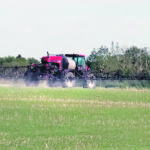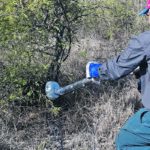Researchers say the system has proven to be safer, cleaner and just as effective as conventional manual herbicide sprays
Herbicide delivery is normally achieved by spraying, but now researchers at Australia’s University of Queensland have developed a system that uses herbicide-filled capsules drilled into the stems of woody weeds. The system has proven to be safer, cleaner and just as effective as conventional manual herbicide sprays without the threat of negative health impacts on […] Read moreTag Archives herbicide

Many actives make for fewer weeds
Corteva Agriscience launched a herbicide that uses multiple modes of action to take out broadleaf weeds in wheat and barley. The new herbicide called Exhilarate combines Paradigm, which is a formulation of Arylex, Group 4 and Florasulam, Group 2, and MCPA Ester that is also a Group 4. “We actually have a combination of a […] Read more

Herbicide spraying window has not closed yet
Weeds can still take in chemical if they have green material, but growers must wait until they are actively growing
There is a good chance it’s too late for a fall herbicide pass on fields lying under knee-deep snow, but in areas where snow is gone or retreating, there may still be time for an effective fall treatment. Tammy Jones, provincial weed control specialist at Manitoba Agriculture, said as long as weeds have green material […] Read more
BASF to buy Bayer’s seed, herbicide businesses for $7 billion
FRANKFURT, Oct 13 (Reuters) – BASF has agreed to buy seed and herbicide businesses from Bayer for 5.9 billion euros (US$7 billion) in cash, as Bayer tries to convince competition authorities to approve its planned acquisition of Monsanto. BASF, the world’s third-largest maker of crop chemicals, has so far avoided seed assets and instead pursued […] Read more

No-till EU farmers brace for glyphosate ban
British farmer tells farm conference that thinking will have to change without access to the herbicide
LONDON, Ont. — A pioneer in British no-till farming says there’s a good chance European farmers will lose access to glyphosate. “It’s a French and German thing,” Tom Sewell said at the recent Innovative Farmers Association of Ontario conference in London. The politics of those two countries means there is pressure to ban the herbicide, […] Read more
Herbicides keep costs down, help feed world
If farmers stopped using herbicides many environmental groups would be pleased, but consumers may not rejoice because food would be much, much more expensive. A Weed Science Society of America study has concluded that corn yields would drop by 52 percent and soybean yields by 49.5 percent in the U.S. and Canada, if producers didn’t […] Read more

Herbicides keep costs down, help feed world, says new study
If farmers stopped using herbicides many environmental groups would be pleased, but consumers may not rejoice because food would be much, much more expensive. A Weed Science Society of America study has concluded that corn yields would drop by 52 percent and soybean yields by 49.5 percent in the U.S. and Canada, if producers didn’t […] Read more

Quinclorac controversy heats up
Great Northern Growers has decided to continue selling its controversial Clever herbicide, despite warnings from grain companies and crushers that they won’t buy canola sprayed with the product. The active ingredient in Clever is quinclorac, which does not yet have a maximum residue limit in China. The Canola Council of Canada is asking farmers not […] Read more

2,4-D doesn’t cause cancer: Health Canada
Health Canada has concluded that 2,4-D does not cause cancer. Late yesterday the Pest Management Regulatory Agency, a division within Health Canada, released the findings of its special review of 2,4-D, the world’s oldest herbicide. The PMRA initiated the review in 2013, in part because Norway decided to prohibit all uses of 2,4-D. Health Canada […] Read more

Herbicide mixes tackle resistant weeds
While many growers rely on herbicide and crop rotations, a U.S. study finds tank mixtures more effective
A new research study from Illinois casts doubt on a commonly promoted method to combat herbicide resistant weeds. The study of herbicide records from hundreds of fields over an eight-year period in that state showed that rotating herbicides from year to year increased the likelihood of developing glyphosate resistant weeds. Joe Vink, weed management technical […] Read more



